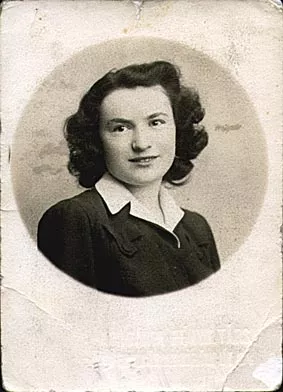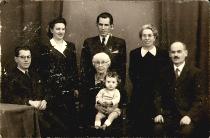This is a picture of me, Olga Banyai nee Mermelstein. This was the photo that my future husband carried with him during the war, I gave it to him when he was called up for workservice [forced labor battalions]. They took everything from us, I don't know how he kept it. I also had a picture. I even had a ring already, but the constables took everything when we were in the brick factory. Here in Pest, they took people away later by a couple weeks. Altogether, they gathered up the Jews and took them away probably within a month.[Plight of Budapest Jews] It went very quickly. They had just kicked me out of my job. An Arrow Cross[soldier] came, and said I had a quarter of an hour to gather my most important belongings, and come with him. What for, where to? You'll see. I packed up, and he took me to Csepel [island in the Danube]. I worked in the Csepel brick factory for a while. There I met a girl, who became my best girlfriend, to the end of her life she was a very good friend of mine. We went through everything together. She was dr. Stefania Mandy, art historian [Stefania Mandy: poet, art historian, translator]. Stefka was already twenty-five years old, she was an art historian, she had already taught. Before they conscripted her for work service, she was already a real person. And a good friend can give you life, too. Not just me, a couple of us stayed alive only because we succeeded in gathering a couple people around us, with whom we didn't talk about, 'My, how hungry I am, a little poppyseed pastry would be great.' Stefania Mandy held lectures for us, she knew a lot, that we didn't. We were twenty years old, or still eighteen, youngsters. And that was what saved our lives. They took us from Csepel to Budakalasz by boat. We were there for five days under the open sky. It rained the whole time. Earlier they'd taken our rings, watches. I was engaged already, the ring, the chain, they took it all. I was left with only the clothes I had on. Then they took us into a room. They said, if somebody has to go to the toilet, go then. We went in line to the toilet, and one of the girls hid fifty pengo in the toilet. Then they got us together and took us into another room. Constables, 'feathered' constables ['kakastollas csendorok', named for the rooster feather on their helmet] came, and started to beat us. We were all girls. And they only beat us, because nobody talked, because the girl who hid the money wasn't among us.
Olga Banyai
The Centropa Collection at USHMM
The Centropa archive has been acquired by the United States Holocaust Memorial Museum in Washington, DC.
USHMM will soon offer a Special Collections page for Centropa.
Academics please note: USHMM can provide you with original language word-for-word transcripts and high resolution photographs. All publications should be credited: "From the Centropa Collection at the United States Memorial Museum in Washington, DC". Please contact collection [at] centropa.org.













